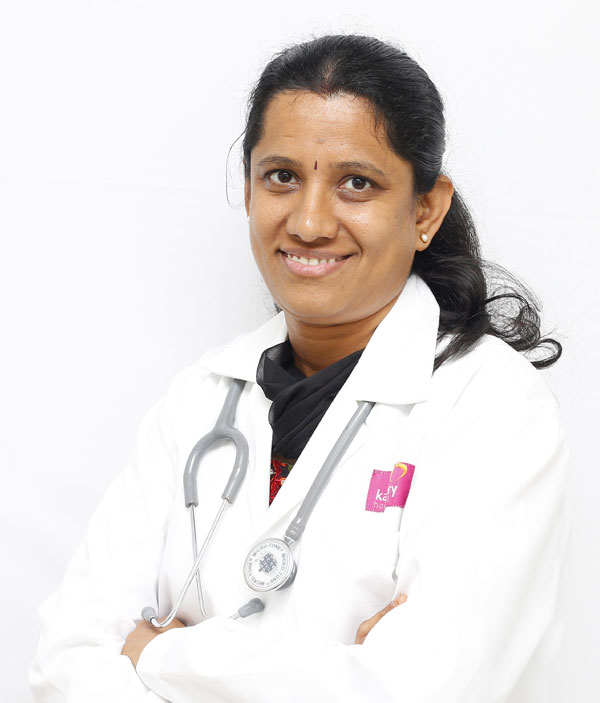
Menopause is defined as 1 year of no periods in the age group of 40-55 years in someone who has been having regular/irregular menstrual cycles (Average age in India – 46 years, all over in World – 51 years). Many women find it difficult to go through the phase of Menopause. Biologically, menopause is the visible decline in ovarian function. Even after menopause, the ovaries produce hormones like estrogen, progesterone and androgen, but may not result in periods.
Osteoporosis
Ovaries are important endocrine organs for our wellbeing apart from reproductive function. The ovarian hormones estrogen and androgens have very good effect on bone mineralisation. So, decrease in androgens and estrogens after menopause leads to osteoporosis. We have heard of elderly women having hip fracture, wrist fracture and spine fracture after minor falls or injuries. This can be avoided by strengthening the bones, muscles and joints by good exercise, calcium and vitamin D3 supplementation and early identification of osteoporosis by DEXA (Dual energy X ray absorptiometry) Scan. Osteoporosis can be treated by medicines. The main aim is to prevent falls and injuries by safety measures everywhere by all.
Heart Problems
Heart problem like Chest pain, heart attack (myocardial infarction) is quite rare in premenopausal women. This does not mean that premenopausal women do not have heart attacks. Maintaining a healthy life style like brisk walking or any other exercise, eating healthy food is very important. Women are also prone to metabolic problems like Diabetes and Hypertension. But the manifestation is later than in men.
Weight Gain
Many women feel that weight gain is a major problem around menopause. There is a steep decline in basal metabolic rate as we grow older. Only diet and exercise can help decrease or control this weight gain. There is a great emphasis on 30 mins of sweat inducing physical exercise, 4-5 days of the week along with well-balanced nutritious diet to control this weight gain.
Irregular Periods
Many women, almost 60% have irregular periods before menopause. This is really bothersome in our society because of the cultural taboos. This leads to unpredictable periods so that women are not able to go to pilgrimages, attend festivals or home rituals. Irregular periods are common around menarche (the first period) and menopause. The Ovarian hormones production is irregular and so the menstrual cycles are also irregular. We need to do a scan to check the uterus, ovaries and a pap smear (screening test for Cervical cancer). Most women have irregular cycles with flow decreasing as they reach menopause. Any irregular bleeding needs to be evaluated. Post-menopausal bleeding (Bleeding 1 year after no periods) also needs evaluation to rule out endometrial polyps, hyperplasia (thickening of the endometrium due to excess estrogen), endometrial and cervical cancer. A lot of medical management is available to treat irregular periods around menopause and hysterectomy can be the last resort for non-cancerous conditions.
Empty Nest Syndrome
It is a feeling of grief and loneliness parents feels when their children leave home for this first time as to live on their own or to attend college or university or get married. It is very commonly seen in women, because they have been very active all these years taking care of their children and family. Suddenly they feel they have less work to do. I think it’s a passing phase as children at some point have to fly with their own wings and become responsible, independent citizens. The best way to cope is to accept the change and get into some activities of their choice like Zumba, yoga, Meditation or to learn something new in their free time or do Social service. It’s time for women to make friends, socialise and enjoy their life and carry on with their passion. As time passes, things will settle and keeping themselves busy in any activity is paramount importance.
Psychological Symptoms
Mood swings, emotional changes, hot flushes, night sweats, sleep disturbances can be worrying around menopause. There are various medications to manage them. Most of them settle down few years after menopause. The best way is to do good physical exercise, healthy diet and listening to music and reading books. As we tell all youngsters, we request all senior citizens to read books or listen to music before going to bed and avoid gadgets at least 2 hours before going to bed. Please do not check WhatsApp, Facebook in the midnight when you get up to pass urine. The whole sleep cycle gets disturbed and it becomes difficult to fall asleep again. This leads to daytime tiredness and sleepiness. Loss of memory is a frequent complaint, but brain stimulating simple exercise like Sudoku keeps the neurons active. This can delay memory loss and Alzheimer’s disease.
Urinary Symptoms
Many women suffer from urinary frequency, incontinence and bedwetting during or after menopause. These symptoms need thorough evaluation by the Gynaecologist. Most of the time, simple treatments like pelvic floor exercises and bladder training can decrease the symptoms and quality of life is very much improved. Please consult your Gynaecologist if you have any urinary symptoms, itching or burning in the private parts. Vaginal dryness can be easily treated with simple medications or creams.
Age is just number for all of us. Let us not be deterred by this increasing number besides our name. Let us all consider menopause as a normal physiological process (our mothers, grandmothers have also passed through this phase!). Regular screening for major diseases and timely medical help can avoid major problems like cancer, osteoporosis. Minor issues wane away with time and they can be managed by simple life style measures or medications. Menopause is neither a boon nor a bane and it all depends on how we accept the changes and carry on with our lives with good mental & physical health.
“LETS NOT TALK OR THINK NEGATIVELY ABOUT MENOPAUSE and BE PREPARED TO ACCEPT MENOPAUSE AND ITS CHANGES”

Dr. Karpagambal Sairam DGO, DNB, MRCOG (London)
Consultant Obstetrician, Gynaecologist and Fertility Specialist
Kauvery Hospital, Chennai

